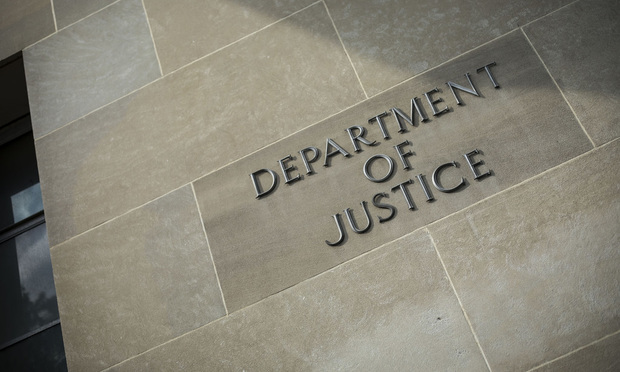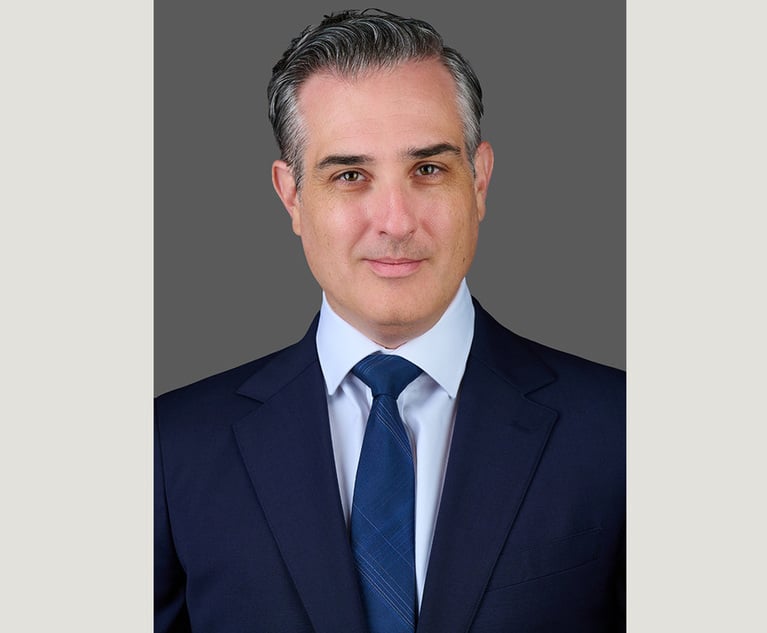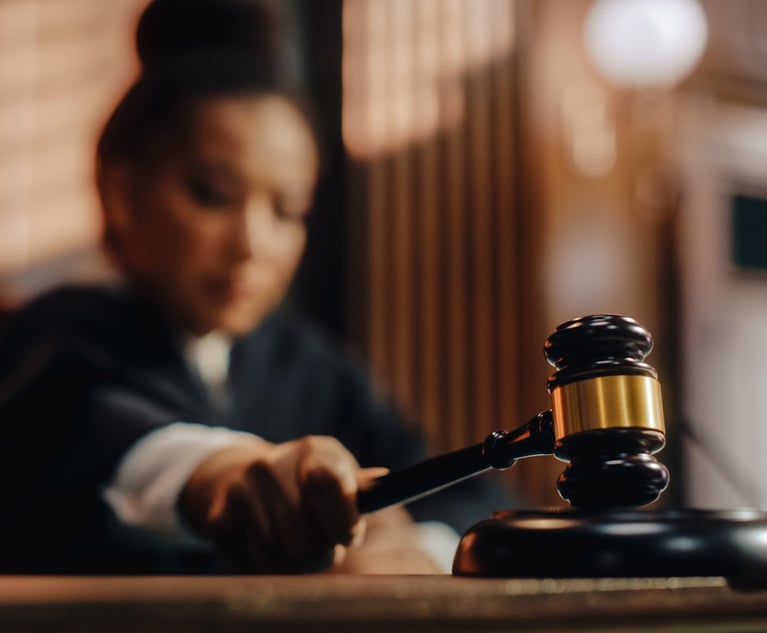3rd Circ.: Immigrant Can't Waive Deportation Stemming From Marriage Fraud
The government claims Gordon Ndok Tima was inadmissible for entry into the United States because he used fraudulent tactics to gain admission.
September 06, 2018 at 03:47 PM
3 minute read
 U.S. Department of Justice building in Washington, D.C. (Photo: Diego M. Radzinschi/ALM)
U.S. Department of Justice building in Washington, D.C. (Photo: Diego M. Radzinschi/ALM)
A Cameroonian national attempting to ward off deportation encountered a significant blow when a federal appeals court denied his request that removal charges related to his nearly 30-year-old conviction of marriage fraud be forgiven.
The U.S. Court of Appeals for the Third Circuit on Thursday denied Gordon Ndok Tima's request for a waiver of the government's arguments for deporting him. The government claims Tima was inadmissible for entry into the United States because he used fraudulent tactics to gain admission.
Tima arrived in the U.S. in 1989 on a student visa, and when that expired, entered into a sham marriage with Sandra Marr, Third Circuit Judge Stephanos Bibas wrote in the court's opinion. He pleaded guilty and admitted to the fraud, but the government did not immediately initiate deportation proceedings.
Tima eventually moved on and legally married another woman in 1997, Florence Fomundam, who is a naturalized U.S. citizen. They have three children, who are all U.S. citizens.
However, the government caught up with Tima and issued him a notice to appear for immigration proceedings in 2003, ultimately pushing it back to 2010. He was charged and deemed removable for his false claim of marriage, termination of conditional-permanent resident status, and committing a crime of moral turpitude.
Tima argued that a waiver he was granted for the marriage fraud conviction should extend to the crime of moral turpitude charge as well as his false statement charge.
Bibas said the text of the law—8 U.S.C. Section 1227(a)(1)(H)—forecloses that possibility.
The fraud waiver to the law contains three parts, laid out by Bibas: “The first part grants the attorney general discretion to waive '[t]he provisions of this paragraph' for certain aliens. The second part lists eligibility conditions for the waiver. And the third part extends the scope of a discretionary waiver to removal charges based on 'grounds of inadmissibility directly resulting from such fraud or misrepresentation.'”
Bibas said for the waiver to apply an immigrant had to have been otherwise admissible except for inadmissibility based on failure to file the proper paperwork or entering into unauthorized labor.
If an immigrant does “not qualify for the discretionary waiver in the first part, then the third part cannot 'operate,'” Bibas said. “So if the third part does 'operate,' it must be limited to removal based on the two 'grounds of inadmissibility.'”
“Thus,” Bibas claimed, “the third part can waive removal only if it is based on the particular grounds of inadmissibility mentioned in the eligibility-conditions list. But Tima's removability is based on his moral-turpitude conviction, not on any ground of inadmissibility, let alone the two enumerated ones. So his claim fails.”
Matthew J. Archambeault represents Tima and did not return a call seeking comment.
Karen L. Melnik, an attorney in the U.S. Department of Justice's Office of Immigration Litigation, handled the case for the government and did not return a call seeking comment.
This content has been archived. It is available through our partners, LexisNexis® and Bloomberg Law.
To view this content, please continue to their sites.
Not a Lexis Subscriber?
Subscribe Now
Not a Bloomberg Law Subscriber?
Subscribe Now
NOT FOR REPRINT
© 2025 ALM Global, LLC, All Rights Reserved. Request academic re-use from www.copyright.com. All other uses, submit a request to [email protected]. For more information visit Asset & Logo Licensing.
You Might Like
View All
People in the News—Jan. 9, 2025—Rawle & Henderson, Armstrong Teasdale
3 minute read


Phila. Court System Pushed to Adapt as Justices Greenlight Changes to Pa.'s Civil Jury Selection Rules
5 minute readTrending Stories
Who Got The Work
Michael G. Bongiorno, Andrew Scott Dulberg and Elizabeth E. Driscoll from Wilmer Cutler Pickering Hale and Dorr have stepped in to represent Symbotic Inc., an A.I.-enabled technology platform that focuses on increasing supply chain efficiency, and other defendants in a pending shareholder derivative lawsuit. The case, filed Oct. 2 in Massachusetts District Court by the Brown Law Firm on behalf of Stephen Austen, accuses certain officers and directors of misleading investors in regard to Symbotic's potential for margin growth by failing to disclose that the company was not equipped to timely deploy its systems or manage expenses through project delays. The case, assigned to U.S. District Judge Nathaniel M. Gorton, is 1:24-cv-12522, Austen v. Cohen et al.
Who Got The Work
Edmund Polubinski and Marie Killmond of Davis Polk & Wardwell have entered appearances for data platform software development company MongoDB and other defendants in a pending shareholder derivative lawsuit. The action, filed Oct. 7 in New York Southern District Court by the Brown Law Firm, accuses the company's directors and/or officers of falsely expressing confidence in the company’s restructuring of its sales incentive plan and downplaying the severity of decreases in its upfront commitments. The case is 1:24-cv-07594, Roy v. Ittycheria et al.
Who Got The Work
Amy O. Bruchs and Kurt F. Ellison of Michael Best & Friedrich have entered appearances for Epic Systems Corp. in a pending employment discrimination lawsuit. The suit was filed Sept. 7 in Wisconsin Western District Court by Levine Eisberner LLC and Siri & Glimstad on behalf of a project manager who claims that he was wrongfully terminated after applying for a religious exemption to the defendant's COVID-19 vaccine mandate. The case, assigned to U.S. Magistrate Judge Anita Marie Boor, is 3:24-cv-00630, Secker, Nathan v. Epic Systems Corporation.
Who Got The Work
David X. Sullivan, Thomas J. Finn and Gregory A. Hall from McCarter & English have entered appearances for Sunrun Installation Services in a pending civil rights lawsuit. The complaint was filed Sept. 4 in Connecticut District Court by attorney Robert M. Berke on behalf of former employee George Edward Steins, who was arrested and charged with employing an unregistered home improvement salesperson. The complaint alleges that had Sunrun informed the Connecticut Department of Consumer Protection that the plaintiff's employment had ended in 2017 and that he no longer held Sunrun's home improvement contractor license, he would not have been hit with charges, which were dismissed in May 2024. The case, assigned to U.S. District Judge Jeffrey A. Meyer, is 3:24-cv-01423, Steins v. Sunrun, Inc. et al.
Who Got The Work
Greenberg Traurig shareholder Joshua L. Raskin has entered an appearance for boohoo.com UK Ltd. in a pending patent infringement lawsuit. The suit, filed Sept. 3 in Texas Eastern District Court by Rozier Hardt McDonough on behalf of Alto Dynamics, asserts five patents related to an online shopping platform. The case, assigned to U.S. District Judge Rodney Gilstrap, is 2:24-cv-00719, Alto Dynamics, LLC v. boohoo.com UK Limited.
Featured Firms
Law Offices of Gary Martin Hays & Associates, P.C.
(470) 294-1674
Law Offices of Mark E. Salomone
(857) 444-6468
Smith & Hassler
(713) 739-1250





